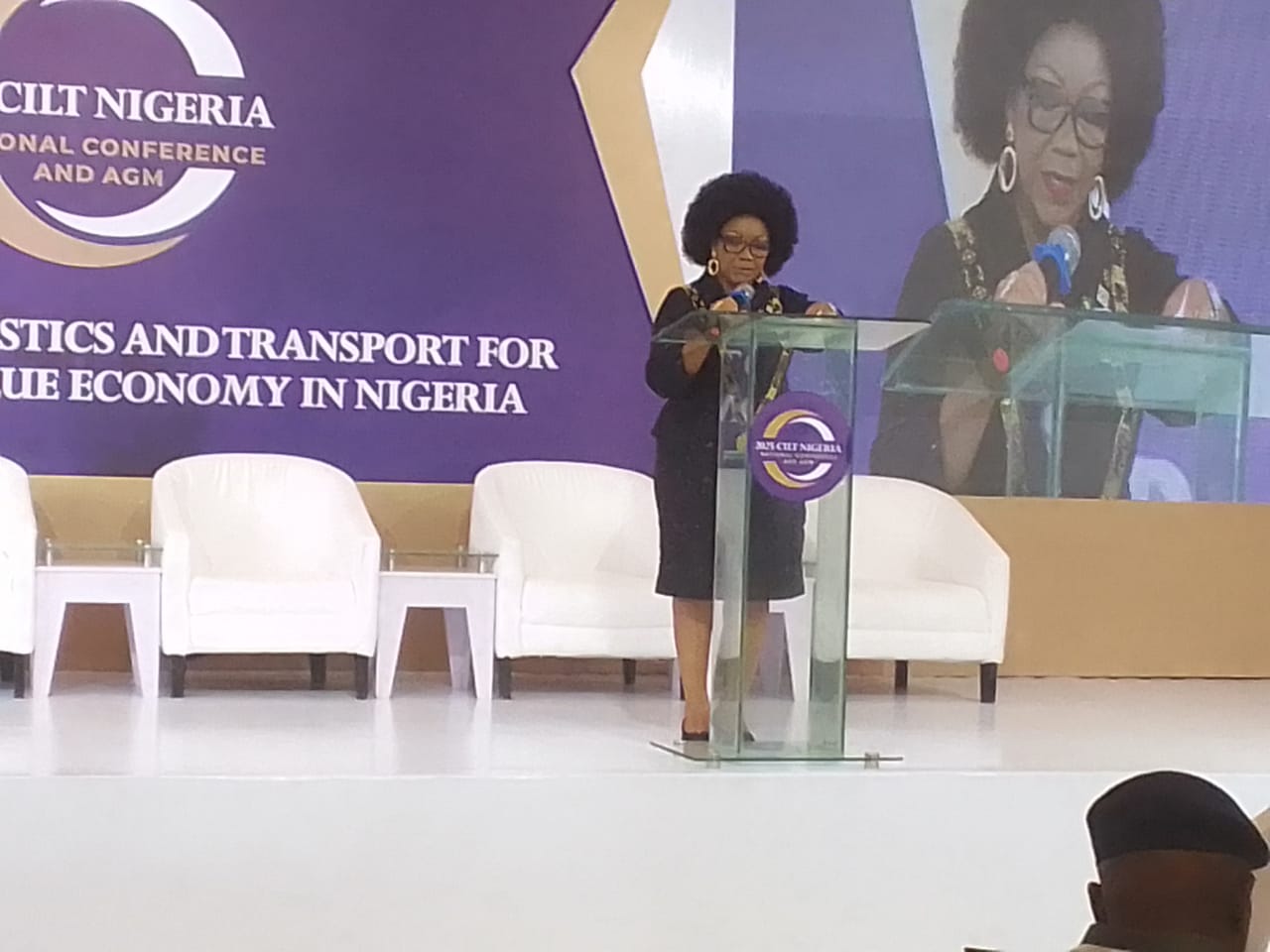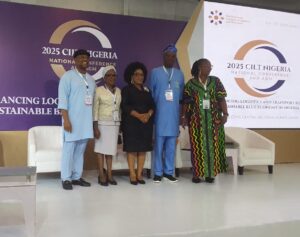CILT Calls for Strategic Placement of Transport, Logistics Professionals in Blue Economy Ministry

The President and Chair of Council Chartered Institute of Logistics and Transport (CILT) ,Nigeria , Mfon Ekong Usoro has drawn the attention of the Minister of Marine and Blue Economy , Adegboyega Oyetola to reports that state that positions for professionals in logistics and transport in the public service are filled with engineers and administrators, rather than persons trained in logistics and transport.
Speaking at the Chartered Institute of Logistics and Transport Nigeria 2025 National Conference and Annual General Meeting, in Lagos, themed “Enhancing Logistics and Transport for Sustainable Blue Economy in Nigeria”, she emphasised that the advocacy of the CILT for the recognition of professionals in logistics and transport in the public service resulted in the creation of the Transport Officer Cadre up to Directorship in the public sector and the experts in supply chain, logistics and transport applauded this positive development.
Usoro pointed that students of logistics and transport from several universities that now offer transport and supply chain courses must have confidence in the prospects for employment, given the welcome awareness by the Government of the critical role that efficient supply chain, logistics and transport play in achieving the Renewed Hope agenda.
She however encouraged CILT students not just to earn an international advanced diploma, but to get further degrees so that they can take up those logistics and transport jobs.

The CILT President reported that the Logistics Performance Index, which is a World Bank tool in
measuring the logistics challenges of countries all over the world that are coastal states that have ports states that Nigeria is 81st on the list. According to her, the rank is below the smallest African countries, and that is not where Nigeria should be.She said “We want to be among the first 10 or 12 in the world.”She added that Nigeria can achieve that by investing in logistics infrastructure and not just building ports.
She stated that CLIT earned visibility and relevance through invitation to several seminars and events to deliver papers and to give opinions adding that the interest was fired for more people to join CILT.
“For countries to develop and be judged by the industry as performing well in logistics, they must pay attention to all the critical aspects that forms the logistics and supply chain ecosystem. When the question is linking our performance in logistics to marine and blue economy, it just shows that we do not quite understand and appreciate the linkages with other parts of Nigerian economy.
“We are very pleased that the Head of Service has created a cadre for transport officers up to directorship. Some agencies of government have not actually implemented that. Some have implemented, but they do not fill those positions with experts in the logistics supply chain system.
“We are encouraging that wherever those offices have been created, they should ensure that skilled individuals in logistics transport supply chain management are the ones that get the job. Faculties that have been created in tertiary institutions have decided to establish faculties in transport and logistics.

“Our webinars, which were very regular, conferences with the quality of the content of presentations and the calibre of experts that participate to deliver the papers, imbued confidence in the industry.
The Minister of Marine and Blue Economy, Adegboyega Oyetola, who was represented by the Managing Director of the Nigerian Ports Authority (NPA), Abubakar Dansoho stated that the Ministry is working closely with all stakeholders to achieve a fair price, technology and green input environment that enhances efficiency and reduces oil and gas costs. As part of this commitment, he said the government has approved a $1 billion modernization project for ports in Lagos, a landmark achievement of the government designed to upgrade infrastructure, improve carbon emissions, and expand capacity so we can meet global demand
In the area of inland waterways development, through the National Inland Waterways Authority, Oyetola said navigability, safety, connectivity across major inland waterways are improved upon as well as opportunities for inter-land trade and international integration.
On maritime security and safety, he said with a deep blue project, partners are taking interventions while safeguarding the maritime domain through foreign investment and regional cross-border business initiatives.He gladly informed that for more than three years now, Nigeria has recorded zero piracy on our waterways.
Oyetola urged CILT and its members to continue to champion the adoption of smart and green transport technologies to promote capacity building for non-professional operators, advocate for data-driven planning and decision-making in logistics management, and deepen cooperation with the Ministry and other stakeholders to align their expertise with national aggregates of all different types of projects, such as data-driven processes, one that combines global economic mobility with international mobility and social mobility.

“The procurement process has commenced for similar modernization projects in the eastern ports to ensure balanced development across our maritime networks. These efforts reflect these adversations from determination to improve logistics performance and competitiveness in the maritime and transport sector, making Nigeria a preferred destination for marine maritime trade and investments.
“We have developed a comprehensive 10-year national blue green economy strategy to align our maritime fisheries, logistics, and coastal development policies within the unified sustainable framework. We are creating an enabling environment to best target the essential of our drive, innovation, and job creation approaches.
“We must ensure that our versatile and vibrant communities benefit from the emerging blue economy, that women and youth find meaningful employment within its markets, and that maritime and transport infrastructures with infrastructure will develop in harmony with global climate goals. This calls for collective accessibility for development, industry, academia, civil society, and international partners.”, he said.












ar42qs